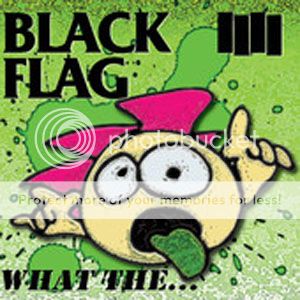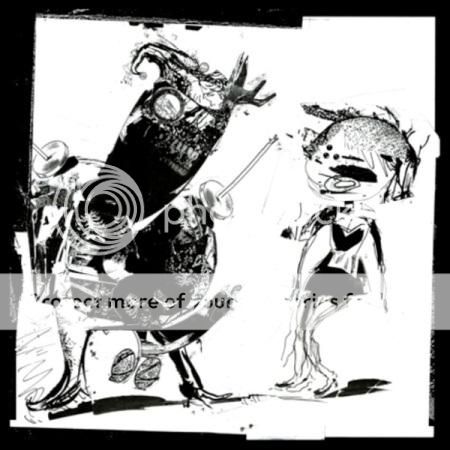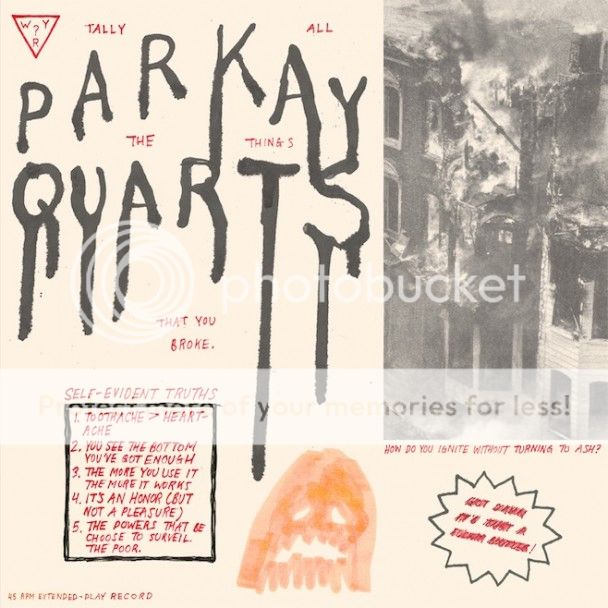Not every guitarist is fast and agile. They aren't all rock gods who try to live up to an image. Some of them are awful, even. In my eyes, a really great guitarist can be anything as long as they strive to establish their own style, within or without a genre. Last time on Five Great Guitarists (which was well over a year ago), I went over such six-string maestros as Tom Verlaine and Ron Asheton, each with a style all to themselves. Sure, Rolling Stone magazine can stick generic blues rocker after generic blues rocker and feverishly try to distinguish them from one another, but at the end of the day all they're doing is exhibiting their lack of real music knowledge. Now, I'm not saying I know it all. I'm not even saying I know anything, really, but what I am saying is that there's more to guitar-based music than the pentatonic scale and a fast fretting hand, and the guitarists I'm going over today are all beyond 'skill' and are moving into 'texture' and 'feeling' territory.
Alan Sparhawk takes 'less is more' to extremes at times. The leadman of 'slowcore' (a term he appropriately dislikes) band Low, who have been releasing beautiful and minimalistic music since their 1994 debut I Could Live in Hope, mixes sparse but tuneful arpeggios and almost inaudible palm muted chugs, sometimes drifting into more feedback-driven sections and ringing lead lines. Usually just riffing on a simple bass-driven progression, the central element to the music was his and drummer/marital partner Mimi's vocal harmonies, which are some of the most beautiful of all time. His real gift is feeling; the first time I heard Low, I thought of snow. They sound positively glacial at times, and with that comes that feeling of relaxed melancholy you get on the first day of snow. His guitar sound paints a picture, never fighting for the spotlight or raging into abandon, but holding its place in the bigger picture. To me, Low represent the other side in the punk spectrum; when audience members would taunt them to be louder, he would turn his amp even further down. Starting from their 2005 album The Great Destroyer, he began using distortion more, but not in a standard rock'n'roll way; it was the same patented Low sound, but this time around it got even more intense and personal, and with a bit more volume came more sonic variance. He has continued experimenting within his own, insular style since, with Low releasing their tenth true studio album, The Invisible Way, in 2013. Essential listening: check out 'Do You Know How to Waltz?', the culminating piece from The Curtain Hits the Cast, which starts as a typical Low piece but veers off further and further into heavy drone.
PJ Harvey has written some of the greatest songs of all time, and in my eyes is one of the greatest female vocalists since the punk era, if not of all time. But she backed up her unhinged and powerful singing in her early days with her guitar, primarily showcasing it on her first two albums, Dry and Rid of Me. Since then, she's moved more into a traditional frontwoman role, but continues to pick up the guitar for numbers from those two seminal albums, and has continued to write a lot of material on the instrument (such as Stories from the City, Stories from the Sea, and of course check out "Uh Huh Her", the live-only title track to her guitar-driven 2004 album, with it's outright monstrous central riff). But the sound she gets on those first couple of albums is something else; it's as savage, emotional, and powerful as her voice is. On Dry and Rid of Me, she was fond of playing around with odd time signatures, too, creating mesmerising and shifting riffs (Missed, Hook) and off-kilter and deceptively simple chord progressions. The fact she sings whilst doing all this is testament to her skill as a musician, if her expansive discography was not that already; and though she has changed her style so many times over by now, her most raw and stripped-down work remains her most vital.
Andy Gill has remained an incredibly influential guitarist ever since the release of Entertainment!. From American post-punk (see below) to funky heavy metal to modern 'indie' and all their variations, his reggae and ska-influenced—but entirely co-opted as his own—style, heavily rhythmic and incredibly trebly, can be found all over the music world. Gill was not only the guitarist of the seminal English post-punk band Gang of Four, but also served as producer and musical director of the band, as well as co-writing the lyrics to the songs alongside Jon King. Their sound—primarily on their first two albums—is unlike the reggae and ska they take some influence from; it's clear and un-dubbed, and at the centre of it is Gill's guitar, harsh and edgy in the most literal sense. His use of stripped-down chords gives the songs room to breathe, he rarely, if ever, used the power-chord chunk that punk was so fond of, and his work is full of irregular sounds and noises drawn from the guitar—from the sustained feedback in 'Anthrax', to the fast muted notes in 'Ether', to his off-tempo freakouts in tracks such as 'At Home He's a Tourist'. Whereas most of his contemporaries were edging towards heavy reverb and delayed notes—basically the style The Edge would cop off with not long after—Gill smashed 'em right in the face with a style as acerbic and spot-on as his band's socio-political lyrics. After Entertainment!, he toned down his tone, and aimed more for a texture-guitar style, best exemplified on their second album, Songs of the Free. Whilst still crucial to his development as a guitarist—and to the development of the band, who would take a more pop-centric route not long after—it never quite beat the punch of that seminal debut.
D. Boon was the frontman of San Pedro, California band the Minutemen, who served as the American equivalent to the funked-out post-punk bands of England. Indeed, they've stated before just how much influence they took from bands such as Wire, Gang of Four and the Pop Group, and it shows in their music; and it just so happens to sound totally un-derivative and as fresh as anything that came from England at the time. D. Boon, who tragically died in a motor accident in 1985, age 27, was not the world's most varied singer, but it was inconsequential when his playing was so unique for his era and location—favouring a Fender Telecaster to get an incredibly trebly sound not too dissimilar to Andy Gill's. The reasoning for this was mostly due to the Minutemen being a 'politically equal' band; the guitar and bass were separated to sound as different and unique of each other as possible—which meant Boon would cut all bass and middle out of his tone, with just the treble remaining. The interplay between him and the equally talented Mike Watt and George Hurley showed a band taking the hardcore punk formula and making something entirely different of it; they had no distortion, but also no pseudo-psychedelic elements—they were an incredibly straight band, and he was an incredibly straight guitar player, yet they remain entirely singular in their style. Boon didn't fuck around, and the further into the career they got, the more obvious it was what a talented guitarist he was, tearing into solos with wild abandon and not sticking to any rigid formula. He never took himself too seriously; he sometimes even used guitar solos as punchlines ('A Political Song for Michael Jackson to Sing'). And although his career was untimely cut short, what he left as a legacy is an inspiration to any aspiring guitar player. He had no lessons, nothing to idolise but his record collection, and from that still became one of the most noteworthy guitarists of his time.
Brian McMahan and David Pajo are the guitarists of Kentucky band Slint. Slint are often recognised as incredibly influential and as the innovators of a 'style' of music now known as 'post-rock', which is a daft phrase, but then again there are few subgenres which begin with 'post' that aren't badly named. In fact, none. Putting Slint into any kind of genre or subgenre is completely missing the point, and is too contrived to be taken seriously. Their music is singular; whilst it contains only the basic rock formula of guitar, drums, bass, and vocals, they were able to pull something entirely unique from it. Just from hearing the opening notes and harmonics of their seminal sophomore album Spiderland one can tell they are in for something different; it sounds eerie yet peaceful, and grounded in reality yet entirely ethereal. David Pajo is the de-facto 'lead guitarist', although that label again seems contrived next to his name. His approach to guitar and in particular harmonics and distortion is singular—just listen to the brilliant and creepy high-pitched riff from 'Nosferatu Man'—and set a template for countless bands in the 1990s and beyond who were more interested in texture than outright rocking. McMahan was the vocalist in the band as well a guitarist, mostly providing spoken word parts with some other shouted/sang parts, and his guitar style is pretty similar to Pajo's for the most part, probably a purposeful act to bring a specific sound to the band. As a pair, they play clean parts mixed with distortion, with a heavy emphasis on dynamics, something that has been present since their debut album, Tweez, a slightly rougher collection of tracks compared to the masterwork of Spiderland yet still an incredibly unique piece of work. One can hear a similar approach to guitar in the work of Steve Albini—who produced Tweez, and no doubt influenced Slint himself. Slint belong to a very special group of independent rock bands from the late eighties to the early nineties, a group who managed to create a new approach to rock music whilst still remaining within the basic structure, although Slint may well be the most unique of the bunch.





